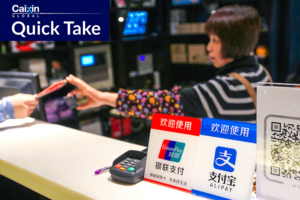In Depth: Alipay and WeChat Pay’s Smaller Peers Struggle Amid New Crackdown
Listen to the full version

As small nonbank payment service providers (PSPs) struggled to compete with giants Alipay and WeChat Pay, they became heavily dependent on a shady practice known as “code stacking” to bolster their profits. But a regulatory campaign to crack down on wrongdoing in the industry with more-stringent rules has put a stop to the scheme, and forced these PSPs to find new business models that are both compliant and money-making.

Download our app to receive breaking news alerts and read the news on the go.
Get our weekly free Must-Read newsletter.
- DIGEST HUB
- Small nonbank PSPs relied on "code stacking" to compete with Alipay and WeChat Pay, but regulatory crackdowns have ended this practice, forcing PSPs to find new compliant business models.
- The number of nonbank PSPs has dropped from 270 in 2015 to 179, and recent regulations have introduced harsher penalties and requirements for market access and operations.
- PSPs are now diversifying by exploring overseas markets and partnering with SaaS companies to sustain growth, although new ventures face significant challenges and competition.
Small nonbank payment service providers (PSPs) in China have faced challenges in competing with major players Alipay and WeChat Pay, relying on a questionable practice called “code stacking” to sustain profits. Regulatory efforts to curb such activities have spurred these PSPs to adopt new, compliant business models. [para. 1]
The market landscape has become more difficult, leading to a decrease in the number of nonbank PSPs from 270 in 2015 to 179 as recently reported by the central bank. The senior executive of a PSP mentioned that the era of earning through “code stacking” is over, pushing them to grow their customer base instead. [para. 2][para. 3]
“Code stacking,” or “tao ma,” involved underreporting transaction processing fees to banks by misclassifying high-fee transactions as lower-fee ones, thus pocketing the difference. This transaction fee is shared among the PSP, a settlement institution, and the card-issuing bank, with the bank receiving the most significant share. [para. 4][para. 5][para. 6]
While this practice violated regulations, it was prevalent among nonbank PSPs due to their thin profit margins. Changes in policy and stricter oversight have now compelled PSPs to abandon this scheme. [para. 7][para. 8]
Authorities have introduced several regulations over recent years to tighten the supervision of nonbank PSPs. Penalties for violations related to practices like “code stacking” have increased, adding to the compliance costs. [para. 9][para. 10]
One notable recent regulatory update came into effect on May 1, encompassing various operational aspects, including market access and user protection. Additional draft rules released by the central bank in April aim to detail the implementation of these regulations. [para. 11][para. 12]
In 2023, around 50 nonbank PSPs were fined for wrongdoings, including prominent examples such as Lakala Payment Co. Ltd., which had to rectify transactions valued at nearly 1.4 billion yuan in 2022. Similarly, Fujian Guotong Xingyi Network Technology Co. Ltd. returned 756 million yuan due to similar practices. UnionPay was also fined 15.4 million yuan for violations related to payment processing, likely connected to “code stacking.” [para. 13][para. 14][para. 15][para. 16]
To survive, PSPs are seeking new growth avenues. Chongqing Globebill Technology Service Co. Ltd., for instance, formed a joint venture with China National Petroleum Corp. to provide payment services at gas stations. PSPs are also tapping into overseas markets to counteract domestic growth slowdowns. [para. 17][para. 18]
Newland Digital Technology and Lakala reported overseas expansion, with Newland noting an 8.7% revenue increase from overseas operations in 2023. Cross-border payment services, while profitable, pose significant challenges due to high compliance costs and stiff competition. [para. 19][para. 20][para. 21]
Some PSPs are venturing beyond payment services by partnering with software-as-a-service (SaaS) companies to offer customized solutions. However, this area is also fraught with difficulties, as intense competition makes turning a profit challenging. [para. 22][para. 23]
The future for small PSPs appears tough, with market supply and demand likely reaching a new equilibrium, potentially forcing some smaller players to exit the industry. [para. 24]
- Ant Group Co. Ltd.
- Ant Group Co. Ltd. owns Alipay, which is one of the dominant payment service providers in China. Known for its significant influence in the market, Ant Group has contributed to the competitive pressure that nonbank payment service providers (PSPs) face, leading many smaller PSPs to employ practices like "code stacking" before regulatory measures were put in place to curb such activities.
- Tencent Holdings Ltd.
- Tencent Holdings Ltd. is the owner of WeChat Pay, a dominant player in the nonbank payment service provider (PSP) market. Alongside Alipay, owned by Ant Group Co. Ltd., WeChat Pay's dominance has contributed to the steep decline in the number of nonbank PSPs. The tougher regulatory environment and competition from these giants have led many small PSPs to explore new, compliant business models.
- China UnionPay Co. Ltd.
- China UnionPay Co. Ltd. is the dominant payment settlement institution in China. In February 2023, it was fined 15.4 million yuan by the People’s Bank of China for violating rules, including those related to payment processing, likely involving "code stacking." It shares transaction fees with nonbank PSPs and banks, earning a smaller portion of the fees.
- NetsUnion Clearing Corp.
- NetsUnion Clearing Corp. is mentioned in the article as a settlement institution for payment transactions involving nonbank payment service providers (PSPs). In the fee-sharing scheme for transactions, NetsUnion Clearing Corp. receives the smallest share of the transaction processing fee. The company plays a role in the regulatory environment affected by the crackdown on illegal practices like "code stacking."
- Lakala Payment Co. Ltd.
- Lakala Payment Co. Ltd. (300773.SZ) is a Shenzhen-listed nonbank payment service provider involved in the practice of “code stacking.” In 2023, it was fined for reporting standard-rate business transactions as reduced-rate ones and had to return nearly 1.4 billion yuan ($208.1 million) for noncompliant behavior. Lakala is also expanding overseas, seeking growth in markets including Japan, Hong Kong, Southeast Asia, Europe, and the U.S.
- Fujian Guotong Xingyi Network Technology Co. Ltd.
- Fujian Guotong Xingyi Network Technology Co. Ltd., a subsidiary of Shenzhen-listed Newland Digital Technology Co. Ltd., was involved in "code stacking" and had to return 756 million yuan in 2022 for such transgressions. The company is exploring overseas markets to compensate for slowing domestic growth, reporting a revenue increase from overseas operations by 8.7% to 2.3 billion yuan in 2023.
- Newland Digital Technology Co. Ltd.
- Newland Digital Technology Co. Ltd. has been expanding its overseas markets due to slowing domestic growth. It is active in Southeast Asia, the Middle East, Africa, Europe, the U.S., and Japan. The company reported an 8.7% increase in revenue from overseas operations in its 2023 annual report, reaching 2.3 billion yuan. Newland Digital Technology focuses on mobile payments and cross-border payment services.
- Chongqing Globebill Technology Service Co. Ltd.
- Chongqing Globebill Technology Service Co. Ltd. established a PSP joint venture, Shenzhen Kunpay Technology Co. Ltd., with state-owned CNPC and another state-controlled firm, providing payment services at CNPC gas stations nationwide. In January 2022, the company announced opportunities in serving small and midsize physical businesses.
- Shenzhen Kunpay Technology Co. Ltd.
- Shenzhen Kunpay Technology Co. Ltd. is a joint venture set up in 2020 by payment company Chongqing Globebill Technology Service Co. Ltd., a subsidiary of state-owned oil giant China National Petroleum Corp. (CNPC), and another state-controlled firm. The venture provides payment services at CNPC’s gas stations across China and has been able to expand its customer base effectively.
- End of 2015:
- Number of nonbank PSPs stood at 270.
- 2023:
- Around 50 nonbank PSPs were fined for code stacking among other violations.
- 2023:
- Newland Digital Technology's annual report noted that its revenue from overseas operations grew 8.7% to 2.3 billion yuan.
- April 18, 2023:
- Lakala Payment Co. Ltd. reported transactions involving standard-rate businesses as reduced-rate ones and would return the relevant funds.
- By April 28, 2023:
- Lakala Payment Co. Ltd.'s annual report showed the sum involved in code stacking could have reached nearly 1.4 billion yuan in 2022.
- December 2023:
- The State Council approved a set of regulations targeting nonbank PSPs.
- February 2024:
- UnionPay was fined 15.4 million yuan by the People’s Bank of China for violating rules including those related to payment processing.
- Before April 22, 2024:
- The central bank released a set of draft rules to complement the May 1, 2024, regulations.
- May 1, 2024:
- A set of regulations targeting nonbank PSPs came into force.
- GALLERY
- PODCAST
- MOST POPULAR







 Sign in with Google
Sign in with Google
 Sign in with Facebook
Sign in with Facebook
 Sign in with 财新
Sign in with 财新